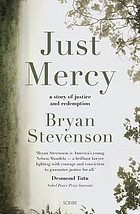This entry contains some quotes from Bryan Stevenson's Just Mercy: A Story of Justice and Redemption. Stevenson is one of the founders of the Equal Justice Initiative. His work is profiled in a documentary and a soon-to-be released feature film.
Proximity to the condemned and incarcerated made the question of each person's humanity more urgent and meaningful, including my own. p. 12
I have discovered, deep in the hearts of many condemned and incarcerated people, the scattered traces of hope and humanity -- seeds of restoration that come to astonishing life when nurtured by very simple interventions. p. 17
[Judicial] elections attract campaign contributions from business interests seeking tort reform or from trial lawyers who want to protect large civil verdicts, but since most voters are unschooled in these areas, the campaigns invariably focus on crime and punishment. Each judge competes to be the toughest on crime. The people financing these elections are largely unconcerned with whatever modest differences exist between candidates on crime, but punishment gets the votes. [p. 70]
In debates about the death penalty, I had started arguing that we would never think it was humane to pay someone to rape people convicted of rape or assault and abuse someone guilty of assault or abuse. Yet we were comfortable killing people who kill, in part because we think we can do it in a manner that doesn't implicate our own humanity, the way that raping or abusing someone would. I couldn't stop thinking that we don't spend much time contemplating the details of what killing someone actually involves. p. 91
Being close to suffering, death, executions, and cruel punishments didn't just illuminate the brokenness of others. In a moment of anguish and heartbreak, it also exposed my own brokenness. You can't effectively fight abusive power, poverty, inequality, illness, oppression, or injustice and not be broken by it. p. 289
The power of just mercy is that it belongs to the undeserving. It's when mercy is least expected that it's most potent -- strong enough to break the cycle of victimization and victim hood, retribution and suffering. It has the power to heal the psychic harm and injuries that lead to aggression and violence, abuse of power, mass incarceration. p. 294
The real question of capital punishment in this country is, Do we deserve to kill? p. 313

